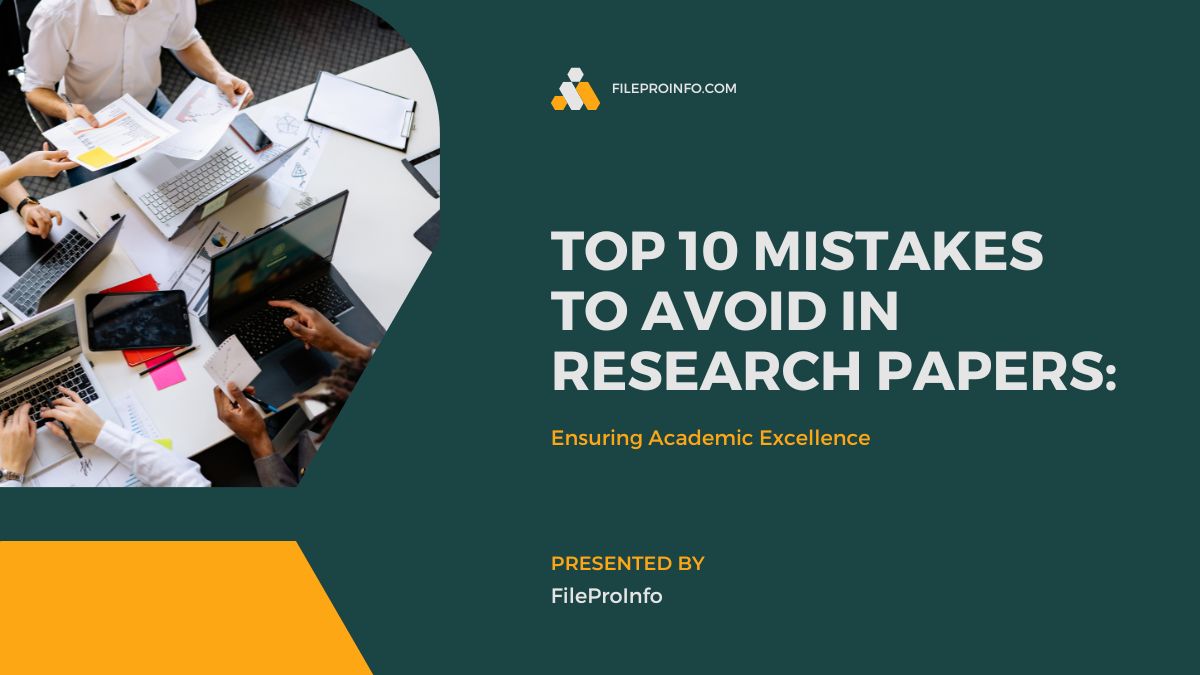
When you are dealing with research paper writing, it is always time-consuming since the primary task is to process and synthesize information based on the given requirements. Since you have to use information from external sources, deal with various file type extensions, and do lots of editing, it is only natural to make accidental mistakes. If you want to ensure that your work represents an example of academic excellence, it is necessary to make a special checklist and double-check for content accuracy. It is always helpful if you can find a trustworthy person who can listen to your writing and make suggestions, yet if you are working independently, these top ten mistakes to avoid will help you do the evaluation yourself!
Top 10 Mistakes to Avoid in Research Papers: Ensuring Academic Excellence
1. Lack of a Hook Sentence.
A research paper without a hook sentence at the very start of your paper takes away from the inspiration part. It can be a fact, an assumption, or statistical information that you provide. If you are unsure about what to use for your particular research type, grabmyessay.com is a great way to consult an expert and see how to improve things and make your target audience motivated to read further!
2. Poor Thesis Statement.
The worst mistake a college professor can encounter is a weak thesis statement that sounds totally out of place. It must be connected to your subject and pose your main argument. If it’s too complex, use one main and one supporting sentence.
3. Lack of Topic Sentences.
The lack of topic sentences makes any research structure confusing. These are used to introduce what’s to come in your body paragraph. It must represent an introduction of your main argument and tell about what your readers will see in a moment. It also helps to narrow things down!
4. Weak Argumentation.
Another mistake is failing to support your arguments with sources or practical examples. It’s not enough to address the theoretical part alone. Keep things vivid and think about the practical implementation. Turn to similar research! It will help explain your methodology and explain why your subject is relevant.
5. New Ideas in Conclusion.
It is often said that you should not introduce any new ideas in conclusion, yet many students still do. They also mistake the call to action or recommendations for new ideas or things they have not tried. If you want to talk about something different, it must also be present in your body parts.
6. Repetitions.
Avoid repeating the same research arguments over and over. If something has already been mentioned in the introduction section, keep things brief and do not go into details. This way, you will avoid repetitions in the body parts and can focus on analytical and evaluation parts.
7. Incorrect Citing.
When it comes to citations, a frequent mistake is the use of quotes or citations without an introduction first. Do not just use someone’s statements if they are not explained or used to support your words! Always have an introduction and post-analysis sentence for every quote used!
8. Formatting Mistakes.
Another mistake that plagues academic research writing is poor formatting and misunderstanding of page layout and the use of structure elements like headers, running heads, and indents. While it may seem minor, it can seriously decrease the final grade.
9. Weak Proofreading.
While most students will do the editing part and even dedicate time to check their research paper’s part, it is the lack of proper proofreading that poses a problem. It is recommended to have another pair of eyes to check things for you, yet if it’s not possible, always proofread your work aloud and see how things sound to make relevant corrections.
10. Lack of Author’s Voice.
While it will always depend on the type of your research, certain papers have a problem of very little to no author’s voice. Remember that research is not a summary or paraphrasing of someone else’s work. You have to contribute and do some analysis as well to make your work stand out and add something valuable to the scientific community. Therefore, the use of only up to three quotes per page is recommended if it’s absolutely necessary or if it represents vital statistical data!
Following Your Grading Rubric!
One of the most common mistakes that even the brightest students seem to make is failing to check one’s grading rubric twice. Sometimes you must implement five external and one internal source (your course materials!) to meet the writing requirements. The same is true for adding information about the author or using certain bits and pieces from the case study file that you have to quote or paraphrase for your research. Therefore, checking your grading rubric twice and asking your academic advisor if something is unclear is crucial. The golden rule is to start with your research paper only when everything is clear. If some element is missing, don’t start before clarifying things! It will help you to save valuable time and avoid a plethora of mistakes usually encountered in academic writing!




